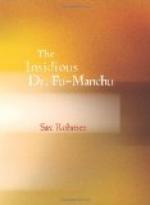He raced up the path, past Inspector Weymouth, who stood swaying there like a drunken man. I was close upon his heels. Behind me came the police.
The door was impassable! Already, it vomited a deathly heat, borne upon stifling fumes like those of the mouth of the Pit. We burst a window. The room within was a furnace!
“My God!” cried someone. “This is supernatural!”
“Listen!” cried another. “Listen!”
The crowd which a fire can conjure up at any hour of day or night, out of the void of nowhere, was gathering already. But upon all descended a pall of silence.
From the heat of the holocaust a voice proclaimed itself—a voice raised, not in anguish but in triumph! It chanted barbarically—and was still.
The abnormal flames rose higher—leaping forth from every window.
“The alarm!” said Smith hoarsely. “Call up the brigade!”
I come to the close of my chronicle, and feel that I betray a trust— the trust of my reader. For having limned in the colors at my command the fiendish Chinese doctor, I am unable to conclude my task as I should desire, unable, with any consciousness of finality, to write Finis to the end of my narrative.
It seems to me sometimes that my pen is but temporarily idle—that I have but dealt with a single phase of a movement having a hundred phases. One sequel I hope for, and against all the promptings of logic and Western bias. If my hope shall be realized I cannot, at this time, pretend to state.
The future, ’mid its many secrets, holds this precious one from me.
I ask you then, to absolve me from the charge of ill completing my work; for any curiosity with which this narrative may leave the reader burdened is shared by the writer.
With intent, I have rushed you from the chambers of Professor Jenner Monde to that closing episode at the deserted cottage; I have made the pace hot in order to impart to these last pages of my account something of the breathless scurry which characterized those happenings.
My canvas may seem sketchy: it is my impression of the reality. No hard details remain in my mind of the dealings of that night. Fu-Manchu arrested—Fu-Manchu, manacled, entering the cottage on his mission of healing; Weymouth, miraculously rendered sane, coming forth; the place in flames.
And then?
To a shell the cottage burned, with an incredible rapidity which pointed to some hidden agency; to a shell about ashes which held no trace of human bones!
It has been asked of me: Was there no possibility
of
Fu-Manchu’s having eluded us in the ensuing
confusion?
Was there no loophole of escape?
I reply, that so far as I was able to judge, a rat could scarce have quitted the building undetected. Yet that Fu-Manchu had, in some incomprehensible manner and by some mysterious agency, produced those abnormal flames, I cannot doubt. Did he voluntarily ignite his own funeral pyre?




